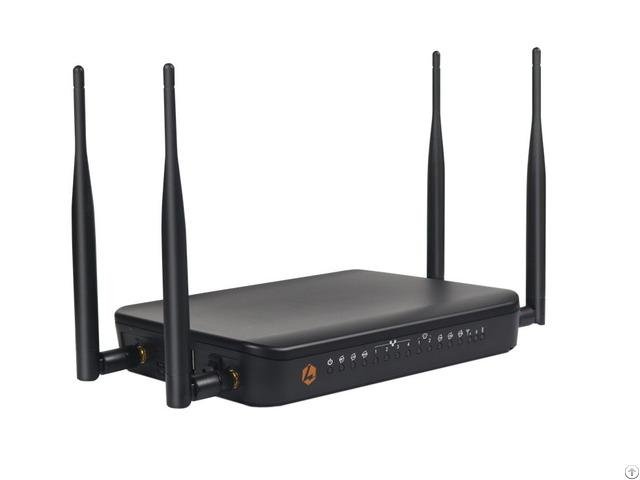4G Industrial Router: Powering the Next Generation of Industrial Connectivity

In the fast-evolving world of modern technology, staying connected is not just a convenience—it’s a necessity. Businesses, factories, and field operations rely heavily on stable, high-speed internet connections to function efficiently. This is where the 4G industrial router steps in as a game-changer. Designed to deliver robust, reliable, and secure network performance in demanding environments, these routers are reshaping how industries communicate and operate.
What is a 4G Industrial Router?
A 4G industrial router is a high-performance networking device built specifically for industrial environments. Unlike standard home or office routers, industrial routers are designed to withstand extreme temperatures, dust, vibration, and power fluctuations. They connect machines, sensors, and control systems through 4G LTE networks, ensuring seamless data transmission even in remote or mobile setups where wired internet may not be available.
These routers are often equipped with multiple SIM slots, advanced firewalls, VPN support, and rugged metal enclosures. This makes them ideal for industries like manufacturing, logistics, energy, transportation, and agriculture—sectors where uninterrupted connectivity can make the difference between operational success and costly downtime.
Why 4G Industrial Routers Matter in Modern Industry
With the rapid rise of automation, IoT (Internet of Things), and smart infrastructure, industries need a communication backbone that is fast, flexible, and fail-safe. The 4G industrial router provides exactly that.
Here are some key reasons why it’s becoming indispensable:
-
Uninterrupted Connectivity
In remote industrial zones—like construction sites, oil fields, or offshore platforms—traditional wired internet is often impossible to install. A 4G industrial router uses cellular networks to provide instant connectivity, allowing devices and systems to stay online anywhere within mobile network coverage. -
Rugged and Durable Design
These routers are built to perform under harsh conditions. Whether exposed to heat, humidity, vibration, or dust, they maintain reliable performance. This durability ensures consistent network uptime, even in the most challenging work environments. -
Secure Data Transmission
Security is critical in industrial communication. A 4G industrial router typically includes advanced encryption, VPN tunnels, and firewall protections, preventing cyber threats and unauthorized access to sensitive operational data. -
Remote Monitoring and Control
Industrial operators can use these routers to monitor and control equipment remotely. This capability enables real-time decision-making, predictive maintenance, and reduced on-site visits, saving both time and costs. -
Plug-and-Play Mobility
Since these routers use 4G LTE networks, they are easy to deploy and relocate. Whether mounted in a vehicle, machine, or control cabinet, they can be quickly set up to deliver high-speed wireless connectivity wherever needed.
Applications of 4G Industrial Routers
The versatility of 4G industrial routers makes them suitable for a wide range of industries. Below are some of the most common applications:
-
Manufacturing Automation: Connects PLCs, sensors, and SCADA systems for real-time monitoring and automation.
-
Smart Transportation: Provides mobile connectivity for vehicle fleets, allowing GPS tracking and telematics.
-
Energy Sector: Used in power grids, wind farms, and solar plants for data transfer and system monitoring.
-
Retail and Banking: Ensures backup connectivity for ATMs and point-of-sale systems during network outages.
-
Construction and Mining: Delivers reliable communication links in temporary worksites or underground environments.
-
Agriculture: Enables smart irrigation systems and remote monitoring of farm equipment.
Benefits for Businesses
Implementing a 4G industrial router offers numerous operational advantages. For starters, it reduces the dependency on wired infrastructure, which is costly and time-consuming to install. It also increases flexibility—businesses can expand or relocate operations without waiting for broadband connections.
Additionally, the high-speed 4G LTE technology ensures smooth data streaming and real-time analytics, which are essential for decision-making and automation. By improving communication reliability, these routers help businesses reduce downtime, enhance productivity, and strengthen overall system performance.
4G vs. 5G – Why 4G Still Leads in Industrial Use
While 5G technology is on the rise, 4G industrial routers continue to dominate in many sectors. The reason is simple: 4G networks are more mature, widely available, and stable. They offer sufficient speed and coverage for most industrial applications without the added cost and complexity of 5G infrastructure.
For industries operating in rural or remote locations, 4G remains the most practical and cost-effective choice. Many manufacturers are now developing hybrid routers that can switch between 4G and 5G as coverage expands, ensuring a smooth transition into the future.
Choosing the Right 4G Industrial Router
When selecting a 4G industrial router, businesses should consider factors like:
-
Network compatibility with available 4G LTE bands.
-
Number of Ethernet ports for wired devices.
-
Dual SIM slots for network redundancy.
-
Security features such as VPN, IPsec, and firewall.
-
Mounting options (DIN-rail, wall, or vehicle mount).
-
Temperature and power tolerance for specific environments.
Investing in a high-quality router ensures consistent connectivity and long-term performance.
Conclusion
The 4G LTE router is not just another networking tool—it’s the backbone of modern industrial communication. By offering fast, secure, and reliable connectivity in even the toughest conditions, it empowers industries to operate smarter, faster, and more efficiently.
As the world continues to embrace automation and IoT, 4G industrial routers will remain a key enabler of progress. Whether in manufacturing plants, smart cities, or remote field sites, these powerful devices ensure that the digital world keeps running without interruption. In essence, they are the silent heroes driving the industrial internet revolution forward.
- Art
- Causes
- Crafts
- Dance
- Drinks
- Film
- Fitness
- Food
- Games
- Gardening
- Health
- Home
- Literature
- Music
- Networking
- Other
- Party
- Religion
- Shopping
- Sports
- Theater
- Wellness


